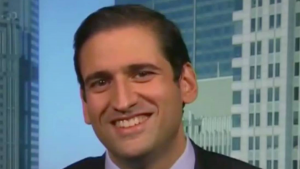Renato Mariotti: “Nunes Memo” may be element of Trump’s obstruction of justice
 Former federal prosecutor Renato Mariotti, and a Democratic candidate running for state Attorney General in Illinois, just posted a thread to Twitter analyzing the so-called “Nunes Memo.” Here is what he says:
Former federal prosecutor Renato Mariotti, and a Democratic candidate running for state Attorney General in Illinois, just posted a thread to Twitter analyzing the so-called “Nunes Memo.” Here is what he says:
What should we make of the Nunes memo?
(Short answer: Not much.)Today, with Trump’s authorization, the Nunes memo was released. I just reviewed the memo and I’ll walk you through it, but my initial reaction to the memo was “this is it?” It’s very underwhelming, given the amount of hype and vitriol directed at the FBI and DOJ based on it.
One piece of context that you need to have as you read the memo is that FISA warrants are approved by judges who read a whole lot of information that is presented to them with an application. They’re lengthy and contain a lot of evidence.*
We haven’t read the FISA applications at issue here, but they were certainly much longer than this memo and contained a lot of information not discussed in this short memo.
By way of background, FISA applications permit the government to listen to conversations of foreign agents. They’re reviewed by federal judges who are appointed to a special court that reviews those applications.
So when the memo says that the dossier was an “essential part” of the FISA application for Carter Page, the argument it’s making is that the judge wouldn’t have signed that warrant if the dossier wasn’t part of the application, even though there was other evidence presented.
The argument being made in the memo is an argument that is often made by people who are wiretapped and want to challenge the warrant. They’re saying that the government omitted details that would have caused the judge not to sign the warrant.
That is a really, really uphill battle in court. Essentially they’re saying that the judge wouldn’t have signed this warrant if he or she knew that Fusion GPS was paid by a law firm that represented the DNC. That’s hard to believe.
Courts often deny challenges to warrants where the government presented information from a cooperator but didn’t mention important details like prior convictions that would impact their truthfulness. It’s really hard to imagine this detail impacting a court’s view of Steele.
After all, Steele is an intelligence professional, not a criminal who is cooperating in hopes of a reduced sentence. As sources of information go, he is a pretty credible one.
Until we get more context, it’s impossible to evaluate just how legally irrelevant the arguments in the Nunes memo are. Perhaps the minority memo will provide some of that context. But I’d be surprised if the memo was more than a short-lived publicity stunt.
One potential long-term consequence of the memo is that media reports today suggest that Trump released the memo in order to undermine the Mueller investigation and/or fire Rosenstein.
If true, it could be used by Mueller as evidence of Trump’s “corrupt” intent for purposes of his obstruction investigation. Trump is making a mistake by personally involving himself in the attack on Mueller and Rosenstein and sharing his strong feelings with others.
 What? Wile E. Dotard’s Acme® Memo might blow up in his face?
What? Wile E. Dotard’s Acme® Memo might blow up in his face?
We’re shocked!
* As attorney Ari Melber mentioned earlier today on MSNBC, the paperwork attached to an application for a FISA warrant generally runs hundreds [sometimes thousands] of pages.
